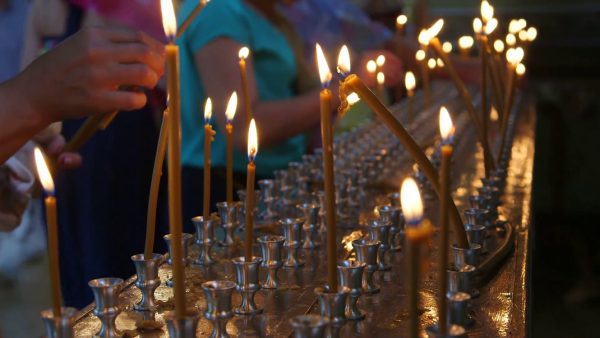2 Corinthians 1:21-2:4; Matthew 22:2-14
It is entirely possible to view participation in the life of the Church as a burden, as just another obligation that we have to fulfill. When we think that way, just about everything else in life seems more appealing than worshiping God. Of course, the more we neglect the spiritual life, the less interest we will have in it. Before we know it, we can easily shut ourselves out of the joy of the Kingdom because we think that we have more important things to do.
The Savior spoke the parable in today’s reading from St. Matthew’s gospel against religious leaders who had become so obsessed with their own desires for worldly power that they rejected the Messiah in Whom all God’s promises to Abraham were fulfilled. The prophet Hosea envisioned the relationship between God and Israel as a marriage, and weddings were great celebrations of God’s faithfulness in blessing the Jews from generation to generation. It is not surprising, then, that Christ often compared the Kingdom of God to a wedding feast. His first miraculous sign in St. John’s gospel was at the wedding in Cana of Galilee. He is the Bridegroom and the Church is the Bride. The book of Revelation also describes the fulfillment of the heavenly reign as a marriage banquet.
How tragic, then, that the religious leaders who should have been in the best position to enter into the joy of spiritual union with Christ refused to do so. They were like the guests invited to the wedding in the parable who “made light of it and went off, one to his farm, another to his business, while the rest seized his servants, treated them shamefully, and killed them.” In the parable, the king then sent his servants out into the streets to invite whomever they could to the celebration, “both bad and good; so the wedding hall was filled with guests.”
The Savior points here to the Church in which the distinction between Jew and Gentile is overcome, for He invites everyone to enter into the great joy of the heavenly banquet. His fulfillment of the human person in God’s image and likeness is not reserved for those of a particular ancestry or nationality. It is not reserved for those who have never fallen short of doing what is pleasing to God. If that were the case, it would have nothing to do with us. The good news is that, even as the king in the parable wanted the banquet hall to be filled, Christ came to save the entire world and turns no one away who responds to Him with humble faith, love, and repentance.
It is one thing to believe that as a theological concept. It is very different and more difficult, however, to embrace this truth spiritually. The knowledge of God is not a matter of having the right thoughts or words, but of being united with Him from the depths of our souls by participation in His grace. When we find ourselves despairing of God’s forgiveness and mercy for our personal brokenness, we must open our hearts to His healing mercy. Instead of being paralyzed by shame, which is simply hurt pride, we must cultivate daily the mindful prayer of the heart: “Lord Jesus Christ, Son of God, have mercy on me a sinner.” Instead of allowing obsessive guilt to keep us focused on how we have failed our illusions of perfection, we must focus on His mercy as we become fully present before the Lord through prayer.
The point here is not to feel a certain way or try to get something from God, but to share in His life as we become more fully human. As those created in God’s image and likeness, we do that by becoming more like God in holiness. This is a journey of humility in which we do not hide our weakness and pain, but instead use them as opportunities to unite ourselves more fully to Christ as we offer even the dark and corrupt dimensions of our lives to Him for healing beyond our own ability.
“Many are called, but few are chosen.” Those words end the parable right after the king ordered that the man without a proper wedding garment be thrown out of the celebration. In that time and place, the host provided guests with the proper attire. This fellow, after being invited to the great banquet, did not respond with decent gratitude and respect toward his host. He refused to put on the garment, but apparently wanted the benefits of being at the party on his own terms. Thus, he excluded himself from the celebration.
We enter into the Body of Christ through baptism, in which we put Him on like a garment. “As many of you as have been baptized into Christ have put on Christ,” wrote Saint Paul. (Gal. 3:27) That is only the beginning of the Christian life, however, and we must attend mindfully to living each day as those who are participating in the Kingdom of God by grace. If we do not, then the entire life of the Church will leave us cold and we will find basic spiritual disciplines to be burdens we would rather do without. If we define what is truly important in life as fulfilling our usual set of daily obligations, satisfying our self-centered desires, and finding ways to distract ourselves from truths we do not want to hear, then we will always think that we have better things to do than to unite ourselves to Christ. At most, we will become like that man who wanted the benefits of being a wedding guest without accepting even the most basic expectations of the invitation. He was completely focused on himself, and shut himself out of the great celebration as a result.
In order to avoid his fate, we must recognize that the Body of Christ is not here to give us what we want on our own terms. Instead, it is in His Body, the Church, that the Savior shares His life with us and makes it possible for us to enter into the joy of heaven even as we live in a world of corruption with all our daily cares. The Divine Liturgy is not a beautiful ceremony for our entertainment or a means of escape from reality, but truly an invitation to participate already in the joy of the heavenly banquet as we struggle to live faithfully each day. We must live out the truth of the Liturgy in everyday life, making our most mundane gifts and challenges opportunities to unite ourselves more fully with the Savior’s great Self-offering for the salvation of the world.
We cannot do that simply by being present for the Divine Liturgy, however. We must offer the daily liturgy of our lives by: praying and reading the Scriptures each day; fasting regularly as a way of humbling ourselves before God; and reaching out to become a sign of God’s blessing to the needy and lonely. We must keep a close watch on our thoughts, mindfully refusing to allow self-centeredness in any form to capture our hearts. We must open our souls to Christ for healing through regular use of the holy mystery of Confession, for that is how we are assured of the Lord’s mercy as we name and repent of our sins.
If we neglect these disciplines, we should not be surprised when life in the Church seems more like a burden than blessing to us. If we want to enter into the joy of the great wedding feast that is the Kingdom of God, we must prepare our hearts, souls, and minds for something far more profound than a religious or cultural event that gives us what we want on our own terms. We must truly unite ourselves to Christ in holiness if we want to participate in the salvation of the human person that He has brought to the world. That is what it means to become truly human as someone created in God’s image and likeness as we wear the wedding garment of the kingdom of heaven.

















